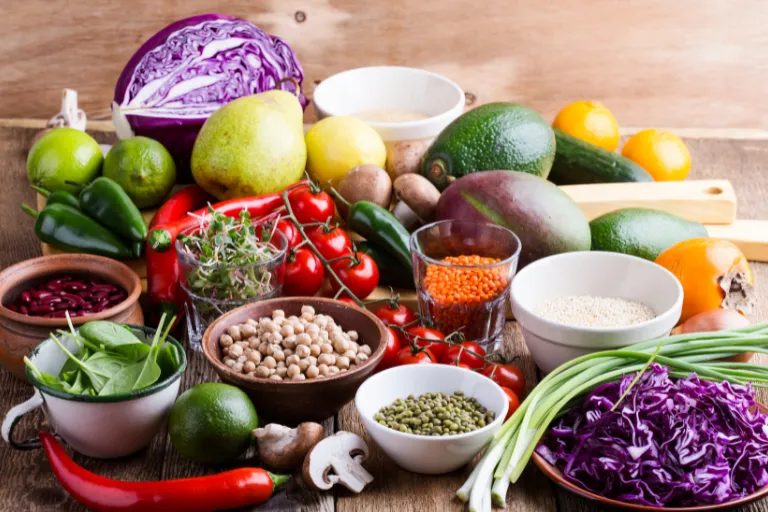Key Points
- Everyday habits—how fast you eat, what foods you choose, and how much water you drink—strongly shape digestive comfort.
- Stress, dehydration, low fibre, and rushed meals are among the most common disruptors of healthy digestion.
- Natural strategies like mindful eating, hydration, regular movement, and gut-supportive foods can noticeably improve digestion.
- Supporting the gut–brain connection can improve digestive comfort and regularity.
Why Your Stomach Reacts to Modern Life
If you’ve ever felt your stomach tighten after rushing through lunch or noticed bloating after a stressful meeting, you’re in familiar territory. Digestive discomfort is common and often shows up after meals or during periods of stress. Estimates suggest that up to 40% of people globally experience recurrent digestive symptoms, many linked to lifestyle factors rather than disease.
What’s encouraging is that digestion often responds well to simple, natural habits. Small adjustments in eating pace, hydration, movement, and stress can help the digestive system operate more smoothly and comfortably—without relying on complicated solutions.
Why Digestive Health Matters More Than You Think
Digestive health affects more than just stomach comfort. It influences nutrient absorption, immune function, energy levels, and even mood. When digestion becomes slowed or disrupted, people often experience irregularity, acid reflux, gut sensitivity, or difficulty processing certain foods. These issues may seem minor at first, but they can affect appetite, sleep quality, and daily comfort over time.
Ongoing digestive issues can also contribute to fatigue and lower stress tolerance over time. Because the gut houses over 70% of the immune system and communicates constantly with the brain through neural and chemical pathways, its balance plays a central role in whole-body health. The good news is that supportive habits can help restore this equilibrium.
Common Disruptors: Everyday Habits That Work Against Your Gut
Modern routines make it surprisingly easy to disrupt healthy digestion. Many people experience symptoms without realising what triggered them. Some of the most common contributors include:
• Eating Quickly
Rushing meals prevents your stomach from preparing adequate enzymes and makes chewing less effective. This increases digestive workload and raises the likelihood of bloating or discomfort. Studies show that slower eating supports better satiety and smoother digestion.
• Low Fibre and Highly Processed Foods
Diets low in fruits, vegetables, and whole grains tend to slow motility and reduce microbial diversity. Meanwhile, processed foods high in refined sugars and additives may affect gut lining integrity or bacterial balance.
• Stress and Irregular Daily Rhythms
Because the gut and brain communicate through the vagus nerve, stress can slow intestinal movement and increase sensitivity to normal digestive processes. Even everyday stress can influence digestion, especially in individuals with an irritable gut.
• Dehydration and Skipped Meals
Not drinking enough water can make the intestines sluggish, while irregular eating patterns can confuse digestive hormones and disrupt natural rhythms.
Understanding these triggers sets the stage for practical solutions.
Behind the Scenes: The Science of How Digestion Really Works
Digestion begins before food reaches your stomach. Chewing activates digestive enzymes that break down carbohydrates, while signals from the mouth and brain prepare the stomach for incoming food. Stomach acid, enzymes, and muscular contractions work together to break food down into absorbable components.
Further along, the small intestine extracts nutrients, and the large intestine uses beneficial bacteria to ferment fibre into short-chain fatty acids—compounds shown to support gut health, immune function, and inflammation balance. This system relies not only on food choices but also on nervous system regulation. When stress rises, the body shifts away from its “rest-and-digest” mode, often slowing digestion or increasing sensitivity.
This connection helps explain why natural practices like slow breathing, gentle walking, or mindful meals support digestion on a biological level.
Practical Strategies to Support Digestion Naturally
1. Slow Down: Mindful Eating
Slowing down your meals gives your body time to activate digestive enzymes and reduces the amount of air you swallow—both of which improve comfort. Chewing thoroughly also helps break food into smaller particles, making it easier for the stomach to process.
Research suggests that mindful eating may help reduce bloating, improve fullness cues, and stabilise digestion in individuals with sensitive guts. Simple habits like setting utensils down between bites can make a noticeable difference.
2. Hydrate Wisely: Hydration and Digestion
Water helps dissolve nutrients, supports stomach acid formation, and keeps the intestines moving smoothly. Even mild dehydration can slow motility and increase discomfort. Warm fluids, such as ginger or peppermint tea, may support comfort for certain individuals.
The key is consistency: sipping throughout the day tends to be more effective than drinking large amounts at once. Adequate hydration is consistently linked with better bowel regularity and digestive comfort.
3. Build Fibre Gradually: Support Your Microbiome
Fibre feeds beneficial gut bacteria and supports regular bowel movements. Soluble fibre helps soften stool, while insoluble fibre adds bulk. A gradual increase is essential—introducing too much too quickly may cause gas or bloating.
Balanced fibre intake supports microbial diversity, an important marker of digestive resilience.
4. Choose Foods That Naturally Support Digestion
Certain foods offer natural digestive benefits:
- Fermented foods like yoghurt, kefir, miso, and kimchi introduce beneficial bacteria.
- Ginger may support motility and reduce nausea in some individuals.
- Peppermint can ease gut discomfort, particularly for sensitive digestion.
- Warm, simple meals such as soups and steamed vegetables tend to be gentler on the digestive tract.
Paying attention to how different foods affect you can help identify what best supports your digestion.
5. Move After You Eat: Gentle Activity That Helps Everything Flow
Light movement encourages the intestines to contract naturally and helps regulate blood sugar after meals. Researchers have found that even a 10-minute walk can noticeably support digestion and post-meal comfort.
Simple options include:
- A slow neighborhood walk
- Gentle stretching
- Yoga poses that support abdominal movement
- Slow breathing exercises to activate the gut–brain connection
6. Support the Gut–Brain Link: Calming Techniques for Better Digestion
Because stress reduces digestive efficiency, calming the nervous system often improves gut comfort. Slow exhalations, brief meditation breaks, journaling, or quiet moments before meals help shift the body toward its “digest and restore” state.
Studies show that practices that support vagal signalling can enhance gut motility and reduce symptoms related to stress-induced digestive disruption.
7. Keep a Predictable Rhythm: Consistency Supports Digestion
Eating on a consistent schedule helps regulate digestive hormones and motility cycles. Irregular eating—or skipping meals—can confuse the gut’s natural timing and lead to discomfort or irregularity.
Some people find it helpful to follow a rhythm such as:
- A nourishing breakfast within 1–2 hours of waking
- A balanced midday meal
- A lighter evening meal to reduce nighttime digestive load
Small routine shifts can have meaningful effects on comfort and energy.
Next Steps: Building a Long-Term Digestive Routine
Improving digestion doesn’t require dramatic changes—just steady, supportive habits that align with how the body naturally functions. If symptoms persist or worsen, consider seeking guidance from a licensed health professional who can evaluate potential underlying causes.
Learning more about the microbiome or gut–brain communication can further support long-term digestive health.
Conclusion
The digestive system responds quickly to supportive daily habits. By slowing down meals, staying hydrated, choosing supportive foods, and incorporating gentle movement, you can improve comfort and support long-term gut health. These natural strategies offer a practical path toward feeling lighter, more energised, and more balanced each day.
Medical Disclaimer:
This blog post aims to be informational and should not replace professional health advice. Always consult with a health professional for personalised advice.
Subscribe for Free for more insightful health articles tailored to your needs.
Sources
- NIH. Keeping Your Gut in Check [Internet]. NIH News in Health. 2017. Available from: https://newsinhealth.nih.gov/2017/05/keeping-your-gut-check
- Department of Health & Human Services. Gut health [Internet]. www.betterhealth.vic.gov.au. 2023. Available from: https://www.betterhealth.vic.gov.au/health/healthyliving/gut-health
- NHS. Good foods to help your digestion [Internet]. nhs.uk. 2022. Available from: https://www.nhs.uk/live-well/eat-well/digestive-health/good-foods-to-help-your-digestion/
- Cherpak CE. Mindful eating: A review of how the stress-digestion-mindfulness triad may modulate and improve gastrointestinal and digestive function. Integrative Medicine: A Clinician’s Journal [Internet]. 2019 Aug;18(4):48–53. Available from: https://pmc.ncbi.nlm.nih.gov/articles/PMC7219460/



